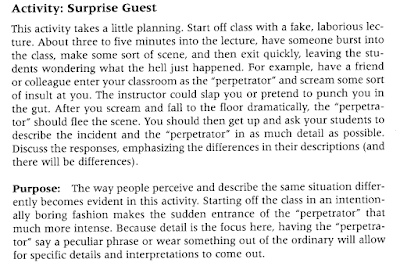A teacher knows everything.
In learning, teachers work as facilitators. They help students with acquiring new things and implementing those new ideas on paper, alongside teachers help the students making the way to use that knowledge in their practical life later.
We all know, teachers need to study a lot. Though, they just get 50 minute class or 1 hour class, they have to research a lot to lead that 50 minutes class. Because when you have to inform others about something, that requires good knowledge over that. If you understand well, only then you can make that easy for your students to understand. Otherwise, you will revolve around and make things difficult for students. For the FYC class, grad student instructors have to go through the same process. They need to study a lot. From my own experience, I can say how many nights I spend on understanding a single topic clearly so that I can quench the thirst of my students. To students, teachers are sources of knowledge. In one sense that’s true. Because teachers spend their lives studying things, they teach. Students have the expectations that their teachers know everything. But that doesn’t work always. It’s impossible for a single person to know everything. However, it is okay to say- I don’t know from teachers' side. That’s reasonable. But for grad instructors to say the same line is something horrible. When I was reading a chapter from Restanio, I found a grad student getting depressed with this thing. She was struggling with saying no and on the other hand, she couldn’t answer accordingly, though she knew the answers. That frustrated her. Obviously, this is something depressing for first-year grad instructors. They already have the fear in mind that students suspect their qualifications and don’t acknowledge the grad students as real teachers sometimes. So, if you come up with the answer “NO”, how they are going to see you. They may question your capabilities as a teacher. These concerns frustrate grad instructors sometimes.
I know this is okay to say ‘I don’t know’. But your intuition at that moment in front of your students may break you down if you can’t think it okay to say 'I don't know".. I know all of you try to get over-prepared before entering a classroom, but even then some unwanted questions may come. I’m not saying questions would be logical always, they can be irrelevant too.
How do you handle that situation? If you haven’t faced any situation like that, what do you think about that? How are you going to tackle those circumstances?


Mow,
ReplyDeleteI understand that it can be really difficult to say "I don't know" in front of our students. This has happened to me a couple of times this semester (both times they were questions about MLA formatting). Even though I know it's fine to say "I don't know," I agree that there is a bit of shame afterwards. To me, it feels like my legitimacy as a teacher is being questioned - if I don't know everything I "should" know, who am I to teach these kids? It's hard to deal with, but this situation comes up for us as grad students more often than it likely would a full-time professor. I would like to say that we should not worry about it, that as grad students it's normal that we don't know things! And those are both true, but it definitely doesn't feel that way.
In my case, I told my students, "I don't know! Let's look it up together. Has anyone heard of Purdue Owl?" And in that way, we were able to learn together the answer to my student's question. Though I may have felt underprepared, it was alright. My students didn't attack, thankfully! Little by little, hopefully we will grow to be okay with the "I don't know"s in class.
Kristen
Mow,
ReplyDeleteI feel like it’s especially easy for grad students to get defensive of our knowledge or qualifications for teaching because, in a sense, we’re often still trying to convince ourselves that we belong in this position. Impostor syndrome is a real issue for a lot of us (and I don’t know if it ever really goes away).
Like you mentioned, I often go into the mode of overpreparing for class because I want to be prepared for any situation, so my students don’t see through to my insecurities in this manner. But students are individuals whose actions we can never fully predict (especially a group of freshmen), and I still am often caught off-guard by their questions. I’ve found a good method, for me at least, is to allow myself to gather my thoughts and not just blurt out something just to give an answer—so I’ll often open the question up to the class or stop to get a drink of water to give myself that space. And if I still don’t have an answer by then, it’s not a bad idea to just tell them “Let me think about that, and I’ll get back to you with an answer the next class period.” I think students often connect to you better if they see you as a human being and not just an all-knowing professor, so sometimes admitting you don’t know something, but are willing to find out, can be the best course of action.
-Jessie
Mow,
ReplyDeleteAs grad students, it is easy to fall into that "imposter syndrome" category where we, at times, don't feel qualified to be doing the work we are doing. I have felt like this at times, but lesson planning and prep immediately relieves that feeling. I also tell my students: "I don't know everything about this- I'll be learning along with you." I especially told them that in regards to MLA and APA. Just the other day, I leveled the playing field by explaining to them that I'm not expecting them to know everything there is to know about documentation, and that even I have to consult Purdue Owl often. I want them to be more familiar with the resources to get to the right answer rather than be a memorization sponge. Never be afraid to say "I don't know. Let me look that up." I think students respect that far more than a falsified or pretense answer.
- McKenzie
Hello Nilima, thank you for your post.
ReplyDeleteI agree that it takes a lot of time to be prepared for the classes we teach so that we feel like we are giving our students the best that they deserve from us. I think that often times, students don’t realize the amount of time and effort we put into each and every class session (let alone creating assignments or giving feedback on their work).
I also think you’re right when you say that it is hard for us as graduate students to say when we don’t know something. I hadn’t really thought of the difference between a tenured professor saying “I don’t know,” vs. someone who has very little experience––someone who the students know has not been at this for very long. I have said on a few occasions that I don’t know the answer to a question students ask me. In this case, I generally open it up to the whole class and ask if anyone else knows the answer. I think they genuinely appreciate our honesty and getting the chance to show their own knowledge. Even if we think it might undermine our authority, it doesn’t mean our students think less of us.